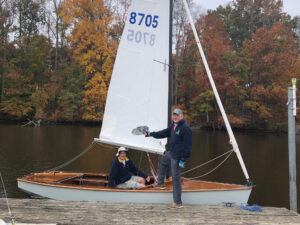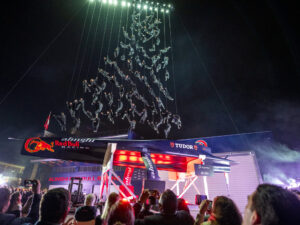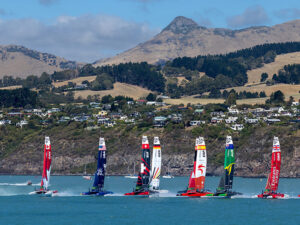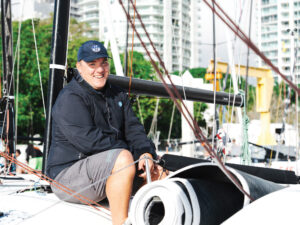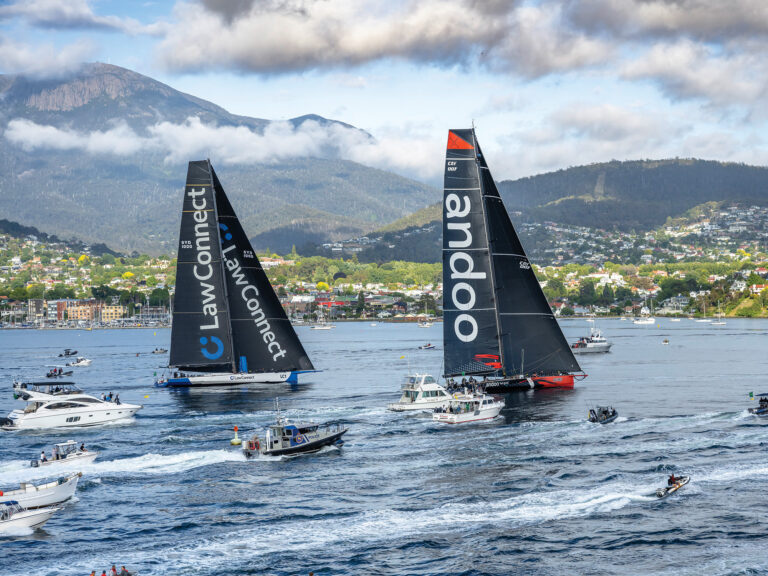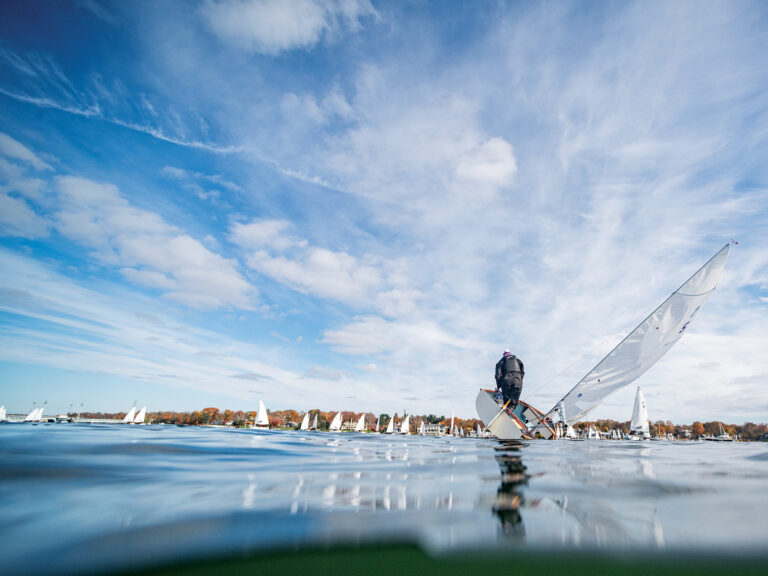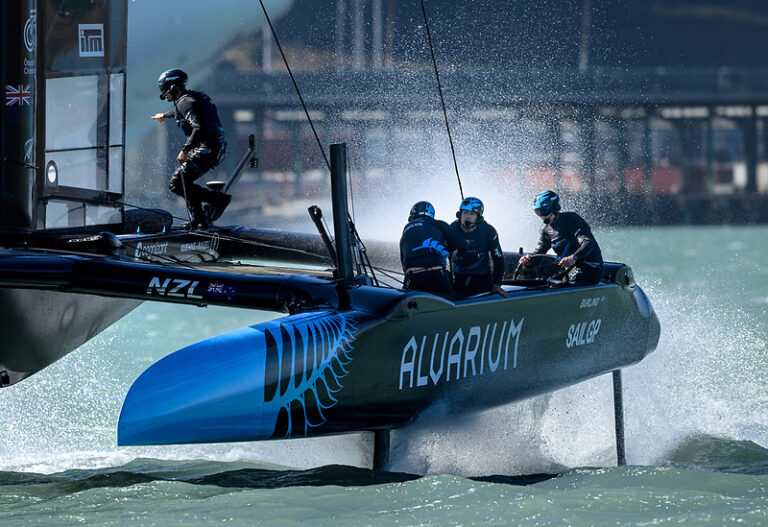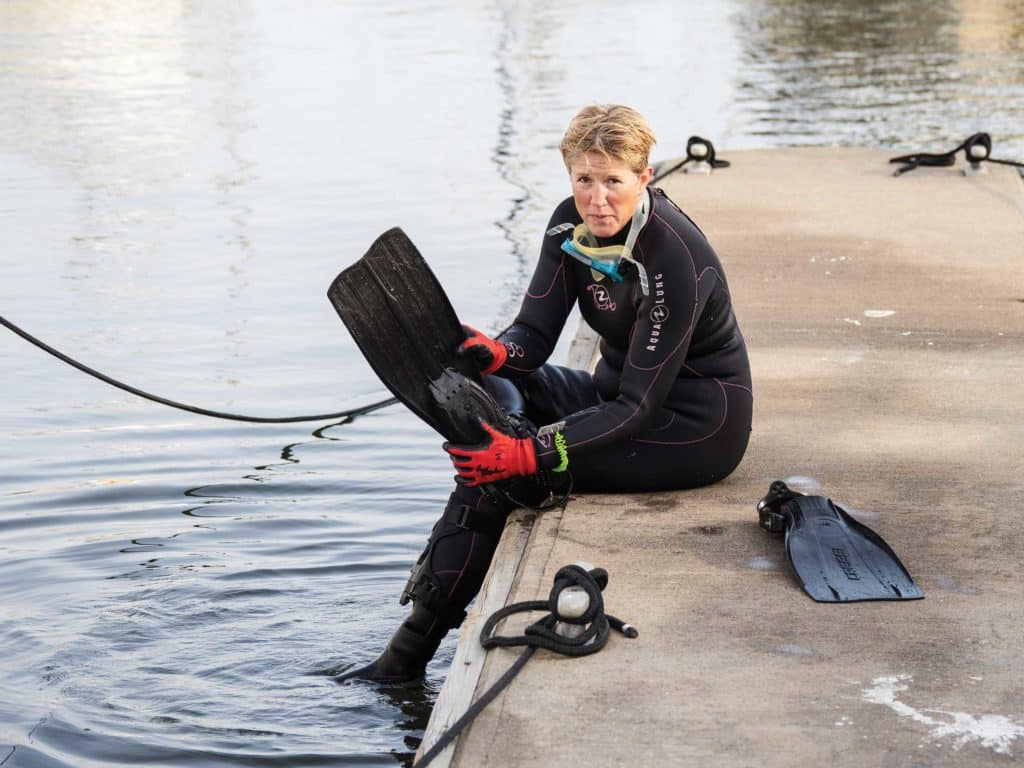
If you must know, it takes Marlene Plumley “about 5.3 minutes” to methodically clean the bottom of a J/70 in the water. She would know because she does every boat the same way every time, and as the diver of choice for many top teams in the class today, she could practically do it with her eyes closed.
“Starboard stern first,” says Plumley, who travels around the country servicing J/70 and J/111 teams. “I start with the starboard side of the rudder, which is the first and last surface I clean. Then I go forward, take a breath, go down, and clean a 2-foot-wide swath from the middle of the boat. Come up, take a breath and go back down, rinse and repeat.”
J/70 class rules prohibit bottom cleaning using breathing apparatus, so Plumley’s tools are simple: a mask, fins, a wetsuit and scrub pads. On one hand she uses a cut-resistant glove to operate a swivel pad, and she uses the other hand to check her work.
How does she know she hasn’t missed a spot? “Drag,” she says. “I can feel it.”
What she can feel and see is the gas film that most sailors don’t even realize exists.
“Photosynthesis happens day and night, above and below the surface,” Plumley says. “Every morning I dive a boat, I see an eighth-inch-thick transparent bio-slime layer, called gas film.”
That’s a slime that will grab dirt and debris in the water column, which we all know is slow, and Plumley doesn’t do slow.
“I look at it this way,” she says. “I am an insurance policy that says your boat is good to go when you leave the dock for racing.”
How this 47-year-old mother of two boys became diver to the one-design stars is a long yarn that dates back to her time in the Air Force, assigned to a combat construction unit. It was back in 1994, on a humanitarian assignment, when heavy equipment fell overboard while offloading. Navy divers offered to give her the “resort course” in diving. After a few more deployments she eventually got her proper certifications, which led to her starting a commercial diving business in Annapolis in 2007 “cleaning dirty hulls.”
But when the state of Maryland banned the in-water cleaning of ablative paints, she shifted to a strictly racing clientele. “Racers are exponentially more valuable,” she says. “Not just from a revenue standpoint, but from a referral standpoint.”
As an example, she says, in 2013, she was hired for a J/70 event to clean for Dave Ullman and Dave Perry. “I went out to dive for one boat and ended up cleaning all of them on the same set of docks, and that one event spring-boarded me into one-design. The curious nature of this beast is that once your number is in a sailor’s phone, you’re the one who gets called.”
The number of clients Plumley takes at each regatta depends, of course, on making sure the boat is perfectly clean when it leaves the dock every morning, which requires dawn dives and the occasional occupational hazards. In Miami, that means stingrays and Portuguese man o’ wars, for which she always carries meat tenderizer. In Marblehead, it’s sharks cruising the harbor from nearby breeding grounds. And for her latest gig at this summer’s J/70 World Championship in Marina Del Rey, California, it’s curious sea lions, and one in particular that spooked her: the “ill-tempered, barky, bitey dive buddy.”
Marine life comes with the territory, and she’s good with whatever challenges come her way—as long as it’s fun. “I don’t put anybody, any event or anything on my schedule if I don’t get some personal professional joy out of it,” Plumley says. “I wouldn’t do it if I didn’t have some sense of joy. I love the J/70 class. The people are incredibly good to me, and there are several customers who have been loyal to me for many years. I don’t take any of that for granted.”
And it’s a good living too. Some event divers pool their expenses and spread them among customers they serve, which requires invoices and chasing money. Plumley’s model is to barter housing from one team in exchange for dives. “It provides a price-stable diver to the rest of the class,” she says. “Regardless of where we go, I am $50 per day, and that way there is no question or crazy math. I’m event pricing, so if there are five scheduled race days, like there are at Worlds, it’s $250, and $50 for practice days.”
The invoice is due before the preparatory signal of the first race of the first day. “No one likes to chase down debtors or be chased,” she says. “There’s a fair bit of trust, but at the end of the day, I have to do the best job I can to keep my job.”

